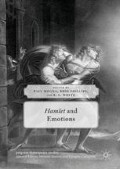Abstract
This essay addresses Horatio’s emotionlessness in light of his role as a narrator, using this discussion to think about Shakespeare’s motives for writing tragedy in the wake of his son’s death. By rationalizing pain and suffering as tragedy, both Horatio and Shakespeare were able to avoid the self-destruction entailed in Hamlet’s emotional response to life’s hardships and injustices. Thus, the stoic Horatio, rather than the passionate Hamlet who repeatedly interrupts ‘The Mousetrap’, is the best authorial avatar for a Shakespeare who strategically wrote himself and his own voice out of his works. This argument then expands into a theory of ‘authorial catharsis’ and the suggestion that we can conceive of Shakespeare as a ‘poet of reason’ in contrast to a ‘poet of emotion’.
Access this chapter
Tax calculation will be finalised at checkout
Purchases are for personal use only
Bibliography
Abrams, M. H. The Mirror and the Lamp: Romantic Theory and the Critical Tradition. New York: W.W. Norton, 1953.
Abdullah, Adnan K. Catharsis in Literature. Bloomington: Indiana University Press, 1985.
Colombo, Rosy, and Gary Taylor (eds.). On Biography. Memoria di Shakespeare 2, 2015.
Crewe, Jonathan. ‘Reading Horatio’. Shakespeare Quarterly 62, no. 2 (Summer 2011): 271–278.
Darling, Rachel. ‘“Written Out”: The Autobiographical Novelist-Character and Writing as Catharsis in Evelyn Waugh’s The Ordeal of Gilbert Pinfold and Muriel Spark’s The Comforters’. STET 4 (2014). http://www.stetjournal.org/memory/darling/.
Engle, Lars. ‘How is Horatio Just?: How Just Is Horatio?’ Shakespeare Quarterly 62, no. 2 (Summer 2011): 256–262.
Greenblatt, Stephen. ‘The Death of Hamnet and the Making of Hamlet’. New York Review of Books, October 21, 2004.
Greenblatt, Stephen. Will in the World: How Shakespeare Became Shakespeare. New York, NY: Norton, 2004.
Hanson, Elizabeth. ‘Fellow Students: Hamlet, Horatio, and the Early Modern University’. Shakespeare Quarterly 62, no. 2 (Summer 2011): 205–229.
Hui, Andrew. ‘Horatio’s Philosophy in Hamlet’. Renaissance Drama 41, no. 1–2 (Fall 2013): 151–171.
Montrose, Louis. The Purpose of Playing: Shakespeare and the Cultural Politics of the Elizabethan Theatre. Chicago: University of Chicago, 1996.
Newman, Karen. ‘Two Lines, Three Readers: Hamlet TLN 1904-5’. Shakespeare Quarterly 62, no. 2 (Summer 2011): 263–270.
Phillips, Christine. ‘Speaking to the Yet Unknowing World: Hamlet, Horatio and the Problem of Imperfect Witness’. Medical Humanities 36 (2010): 97–100.
Shakespeare, William. Hamlet. Edited by A. R. Braunmuller. New York: Penguin Group, 2001.
Smallwood, Philip. ‘Shakespeare: Johnson’s Poet of Nature’. In The Cambridge Companion to Samuel Johnson. Edited by Greg Glingham, 143–160. Cambridge, UK: Cambridge University Press, 1997.
Vogel, Lelaina (dir.). Hamlet. Cambridge, MA: Hyperion Shakespeare Company, 2015.
Warley, Christopher. ‘Specters of Horatio’. English Literary History 75, no. 4 (Winter 2008): 1023–1050.
Author information
Authors and Affiliations
Corresponding author
Editor information
Editors and Affiliations
Rights and permissions
Copyright information
© 2019 The Author(s)
About this chapter
Cite this chapter
Wilson, J.R. (2019). Horatio as Author: Storytelling and Stoic Tragedy in Hamlet. In: Megna, P., Phillips, B., White, R.S. (eds) Hamlet and Emotions. Palgrave Shakespeare Studies. Palgrave Macmillan, Cham. https://doi.org/10.1007/978-3-030-03795-6_10
Download citation
DOI: https://doi.org/10.1007/978-3-030-03795-6_10
Published:
Publisher Name: Palgrave Macmillan, Cham
Print ISBN: 978-3-030-03794-9
Online ISBN: 978-3-030-03795-6
eBook Packages: Literature, Cultural and Media StudiesLiterature, Cultural and Media Studies (R0)

